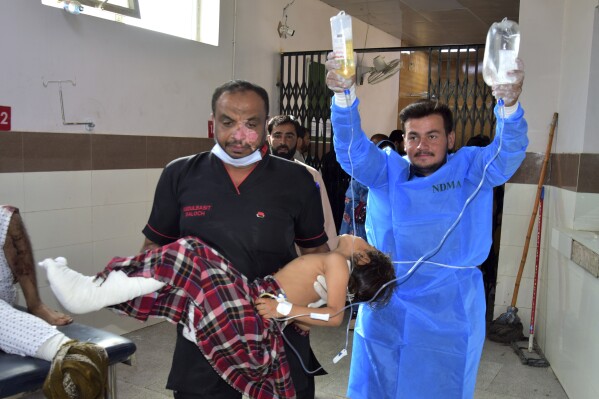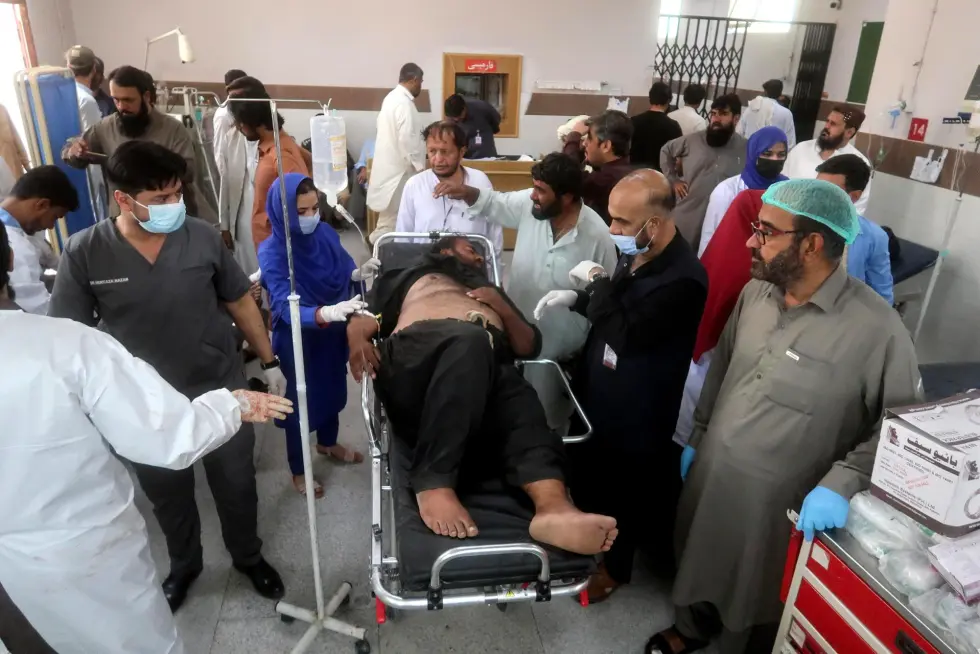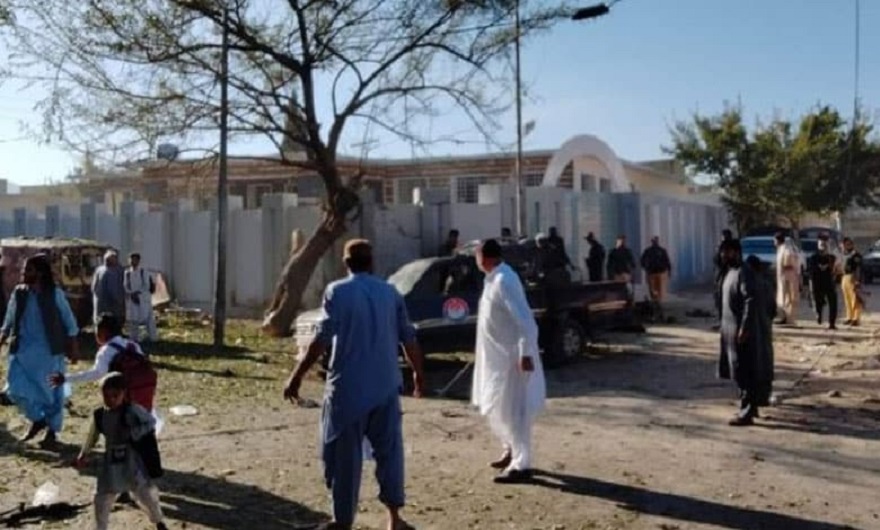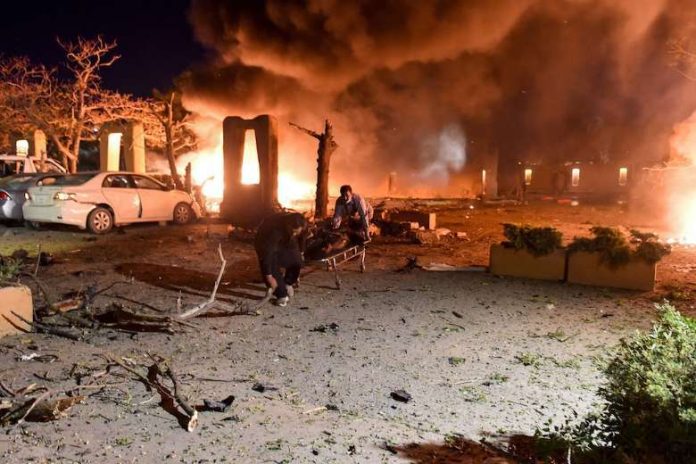Tragic Blast in Pakistan: Schoolchildren Among Victims in Attack Targeting Police.
In a devastating incident that has shocked the nation, at least seven people, including five schoolchildren, lost their lives and 23 others sustained injuries from a blast in southwestern Pakistan on Friday. The explosion, which was reportedly aimed at a police van involved in the transportation of a polio vaccination team, highlights the ongoing struggles Pakistan faces with rising militant violence and the dangerous climate surrounding public health initiatives.
According to Senior Superintendent of Police Rehmatullah, the explosion was caused by an improvised explosive device (IED) attached to a motorcycle parked near a girls’ school in the town of Mastung, Baluchistan province. The IED detonated as the police van approached, leading to a tragic loss of life, including one police officer. The blast occurred during a time when security forces are already under significant pressure from escalating violence in the region.
Witnesses reported scenes of chaos and destruction in the aftermath of the explosion, with injured children and adults being rushed to nearby hospitals for treatment. The tragic nature of the attack, particularly given that schoolchildren were among the casualties, has prompted an outpouring of grief and condemnation from across the country. No group has claimed responsibility for the attack yet, leaving authorities to investigate potential perpetrators.

Prime Minister Shehbaz Sharif condemned the violence in a statement, calling it a “cowardly attack” and underscoring the government’s commitment to fighting terrorism and protecting the lives of its citizens, especially the most vulnerable, including schoolchildren.
This tragic event comes amid a broader surge in militant attacks across Pakistan, particularly in the northwest regions and the southern provinces. The violence has been compounded by a growing separatist insurgency in Baluchistan, where various groups have been known to target security forces and public institutions. Just days before this attack, a policeman lost his life during an assault on a health office responsible for conducting polio vaccination campaigns.
The recent attacks have raised alarms regarding the safety of health workers and volunteers engaged in crucial public health efforts. With Pakistan currently facing its third nationwide polio vaccination campaign, these assaults threaten to derail ongoing efforts to eradicate the disease. Polio, which is a highly infectious viral disease that primarily affects children, has seen a worrying resurgence in some regions.
Although polio cases dropped significantly in 2023, with only six reported cases compared to 20 in 2022, the Prime Minister’s office has indicated that there are currently 41 active cases in Pakistan. Pakistan and neighboring Afghanistan remain the last two countries in the world where polio is endemic, making the safety of vaccination campaigns all the more critical.
The violence surrounding polio vaccination efforts has roots in deep-seated misconceptions and conspiracy theories, particularly propagated by Islamist militant groups. These groups have historically targeted vaccination teams, alleging that the vaccines are part of a Western agenda to sterilize Muslim populations. Such dangerous narratives have resulted in increased hostility toward health workers and contributed to a climate of fear around vaccination efforts.

In light of the recent surge in attacks, health officials and security forces face the dual challenge of ensuring the safety of vaccination teams while also combating the rising tide of misinformation that endangers public health. The attack in Mastung is a grim reminder of the dangers that health workers encounter in the line of duty and the significant barriers they face in their efforts to safeguard the health of children across Pakistan.
The implications of the blast extend beyond immediate casualties, raising profound concerns for the safety of schoolchildren and the psychological impact on young students witnessing such violence. Schools should be safe havens for children, places where they can learn and grow free from the threat of violence. However, the attack has shattered that perception, instilling fear among students, parents, and educators alike.
In a nation where education is already under strain due to economic challenges and socio-political instability, such incidents can further disrupt the education of young children, particularly girls. The presence of violence in their communities can deter families from sending their children to school, fearing for their safety. This can result in a ripple effect, hindering educational attainment and exacerbating existing gender disparities in education.
Local educators expressed their deep concern over the incident, emphasizing the need for enhanced security measures in schools and surrounding areas. “Children should not have to live in fear while pursuing their education,” said a local teacher from Mastung, highlighting the urgent need for protective measures to ensure a safe learning environment.
In the wake of the attack, calls for enhanced security measures to protect both schools and vaccination teams have intensified. Local law enforcement agencies are under pressure to bolster their presence in sensitive areas, particularly those frequented by children and health workers. The government has pledged to take stronger actions against those who threaten public safety, aiming to restore confidence among citizens.
Moreover, public health officials have urged for a renewed commitment to polio vaccination campaigns, emphasizing the importance of protecting children’s health despite the dangers involved. Health ministries and NGOs are now more determined than ever to counter misinformation and foster community engagement to reinforce the importance of vaccinations in protecting children against preventable diseases.
International organizations have also expressed solidarity with Pakistan in its fight against polio and the ongoing threats to public health initiatives. They have reiterated their commitment to support vaccination campaigns and strengthen security measures to ensure health workers can perform their duties without fear of violence.

The tragic blast in Mastung serves as a stark reminder of the complex challenges Pakistan faces as it navigates a path toward peace and public health safety. With schoolchildren among the victims, the incident underscores the urgent need for collective action against violence and misinformation that threaten the lives and futures of the nation’s youth.
As the government, civil society, and international partners work together to combat these challenges, it is crucial to prioritize the safety of children, health workers, and educational institutions. The road ahead may be fraught with obstacles, but with renewed commitment and unity, there is hope for a brighter, safer future for Pakistan’s schoolchildren. The nation must come together to ensure that every child has the opportunity to learn and thrive, free from the shadow of violence.




